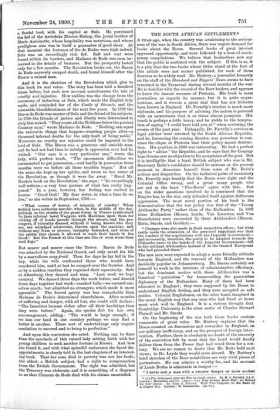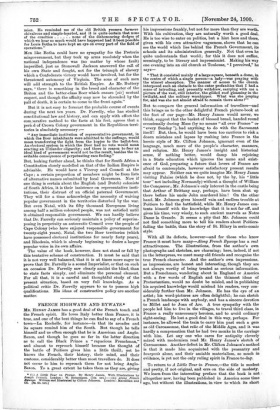THE SO TB. AFRICAN SETTLEMENT.*
A. YEAR ago, when the country was awakening to the serious- ness of the war in South Africa, there was urgent demand for
books about the Boers. Several books of great interest appeared opportunely, and were followed by a host of catch- penny compilations. We believe that booksellers now say that the public is surfeited with the subject. If this is so, it is a pity that the two books whose titles stand at the foot of this article were not sooner published, for each of them deserves to be widely read. Mr. Buttery, a journalist formerly on the staff of the Standard and Diggers' News, seems to have remained in the Transvaal during several months of the war. He is familiar with the record of the Boer leaders, and appears to know the inmost recesses of Pretoria. His book is mere journalism as regards its manner, but it is quite unpre- tentious, and it reveals a great deal that has not hitherto been known in England. Dr. Farrelly's treatise is much more elaborate, and his purpose of advising the nation is pursued with an earnestness that is at times almost pompous. His touch is perhaps a trifle heavy, and he yields to the tempta- tion of saying "I could have told you so" when reviewing the events of the past year. Unhappily, Dr. Farrelly's services as legal adviser were retained by the South African Republic, and he, foreseeing the coming disaster, was powerless to con- vince the clique at Pretoria that their policy meant destruc- tion. His position in 1898 was interesting. He had a perfect right to " advise " the Republic, and he says that Sir Conyng- ham Greene saw no objection to his acceptance of the post. But it is intelligible that a loyal British subject who was in Mr.
Secretary Reitz's confidence should be anxious at the present moment to dissociate himself from some of Mr. Reitz's actions and despatches. On the technical point of suzerainty Dr. Farrelly says frankly that the Boers were right and the Colonial Office wrong, and a great many people who are not in the least "Pro-Boors" agree with him. But on the wider questions involved he is convinced that the
Empire has, in the war, only defended itself against deliberate aggression. The most novel portion of his book is the demonstration that the war policy was that of the "Young
Afrikander Party" rather than of the Hollanders. In 1898 three Hollanders (Messrs. Leyds, Van Leeuwen, and Van Boeschoten) were succeeded by three Afrikanders (Messrs.
Reitz, Smuts, and Grobler) :—
"Changes were also made in their respective offices ; but what really made the alteration of the personnel important was that the conduct of the negotiations with the Imperial Government— and necessarily, therefore, the policy to be adopted towards the Iritlander cause in the hands of the Imperial Government—fell to the militant Afrikanders instead of to the trained Europeans who had preceded them."
The new men were expected to adopt a more friendly attitude towards England, and the removal of the Hollanders was
decidedly popular in Johannesburg. Mr. Smuts certainly set himself to work in the interests of administrative efficiency, but the dominant motive with these Afrikanders was a fanatical " patriotism " far transcending the passionless diplomacy of the Hollanders. Many of them had been educated in England ; they were supposed by the Boers to understand English feeling, and they were accepted as safe guides. Colonial Englishmen, on the other hand, imagined in the usual English way that any man who had lived at home must wish well to England. It is a curious thought that Cambridge University is the alma mater of Charles Stewart Parnell and Mr. Smuts.
On the beginning of the war both these books contain comments of great value. Mr. Buttery explains that the Boers counted on dissensions and cowardice in England, on our military inefficiency, and on the prospect of foreign inter- vention. Further, there is absolutely no doubt of the sincerity of the conviction felt by most that the Lord would finally deliver them from the Power that had vexed them for a cen- tury. We see no reason to doubt that Mr. Reitz held such views; to Dr. Leyds they would seem absurd. Mr. Buttery's brief sketches of the Boer notabilities are very vivid pieces of portraiture. He can admire a worthy foe, and his account of Louis Botha is admirable in temper :—
" I never met a man with a sweeter temper or more modest • (1.) The Settlement after the War in South Africa. By M. J. Fartelly, LL.D. London : Macmillan and Co. 1.10e.)—(2.) Why Kruger Made War: or, Behind the Boer Scenes. By John A. Buttery. With Two Chapters on the Rand by A. Cooper Ley. London : W. Heinemann. Os. 6d.]
mien. He reminded me of the old British yeomen farmers chivalrous and simple-hearted, and it is quite certain that none of the cruelties • none of the dishonouring dodges of -which we hear so much would have happened bad it been possible for Louis Botha to have kept an eye on every part of the field of operations."
Men like Botha could have no sympathy for the Pretoria misgovernment, but they took up arms resolutely when the national independence was (no matter by whose fault) imperilled, just as Stonewall Jackson answered the call of his own State and fought, not for the triumph of slavery which a Confederate victory would have involved, but for the threatened autonomy of Virginia. The sons of such men will add strength to the British Empire. As Mr. Buttery says, "there is something in the breed and character of the Briton and the better-class Boer which ensure [sic] mutual respect, and though the affinity may now be shrouded by the pall of death, it is certain to come to the front again."
But it is not easy to forecast the probable course of events during the next ten years. Dr. Farrelly, who has studied constitutional law and history, and can apply with effect the com,arative method to the facts at his feet, agrees that a pericd of Crown Colony government in the Republican terri- tories is absolutely necessary :— " Any immediate institution of representative government, in which the Boer inhabitants were admitted to the suffrage, would mean transferring the fight from the kopjes to the ballot-box. An electoral system in which the Boer had no vote would mean erecting an Ilitlander oligarchy ; and there is reason to fear an ideal kind of government would not be the result, besides the in. evite.ble consequence of perpetuating race feeling."
But, looking further ahead, he thinks that for South Africa a Constitution closely modelled on that of the Indian Empire is advisable. He would have a Viceroy and Council at the Cape ; a certain proportion of members might be from lists of alternative names submitted by local Governors. Now if one thing is certain about the English (and Dutch) colonists of South Africa, it is their insistence on representative insti- tutions, their distrust of an official paternal Government. They will for a time acknowledge the necessity of waiving popular government in the territories disturbed by the war.
But even Natal, with its fifty thousand Europeans living among half a million coloured people, was not satisfied until it obtained responsible government. We can hardly believe that Dr. Farrelly can seriously maintain a policy of superim- posing in perpetuity an autocratic Council over the people of Cape Colony (who have enjoyed responsible government for twenty-eight years), Natal, the two Boer territories (which have possessed electoral institutions for nearly forty years), and Rhodesia, which is already beginning to desire a larger popular voice in its own affairs.
The value of the book, however, does not stand or fall by this tentative scheme of construction. It must be said that it is not very well balanced;that it is at times more eager to prove that Dr. Farrelly is a sound Imperialist, or that on such an occasion Dr. Family saw clearly amidst the blind, than to state facts simply, and eliminate the personal element. For all that, it is a careful and thoughtful study of the present situation, based on very full knowledge. As a political critic Dr. Farrelly appears to us to possess high qualifications. His ideas of constructive policy are another matter.











































 Previous page
Previous page